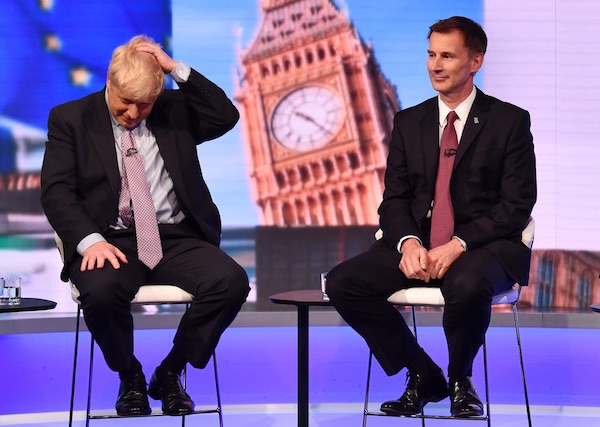
There has been a welcome in Ireland for the result of a survey of Britain’s ruling Conservative Party which revealed that most of its members would be willing to see Irish reunification if it meant that England could leave the European Union. The poll puts the Tories completely at odds with their DUP allies in the London government.
A survey of Conservative Party members found that 59% would prefer to see Ireland united if it secured Brexit, while an even greater number, 63% or almost two in three, would be happy to see an independent Scotland if it meant Brexit would go ahead.
The research comes as the future of Britain looks increasingly uncertain, with another Brexit deadline on the horizon in October and the Tories preoccupied with a leadership contest for at least another month. Mainstream media commentators have taken to predicting ‘the end of the Union’ on a weekly basis.
Of the two remaining candidates for leader of the Conservative Party and British Prime Minister, Boris Johnson (left) and Jeremy Hunt (right), Johnson remains the clear favourite. However, his support will have suffered following shocking reports on Friday that police had to be called to a domestic incident at the home he shares with his partner. That has suddenly darkened the image of the popular but controversial former Mayor of London.
His rival in the leadership vote is the unfamiliar Foreign Secretary Jeremy Hunt, a relative moderate and former opponent of Brexit who is described as “Theresa May in trousers”. He is best known for the frequency his name is mispronounced by news readers.
The Conservative Party membership will be canvassed in the next four weeks and the new leader should be announced by the last week of July.
While both candidates could be tempted to call for an ‘England First’ Brexit in the wake of the YouGov poll, one of the first tasks of the future Conservative leader and Prime Minister will be to tackle the hardline unionist DUP, who are keeping the party in government through a confidence-and-supply arrangement.
The DUP’s Brexit stance is to remilitarise the border between the north and south of Ireland by pulling the Six Counties out of the EU, regardless of the damage to the economy or the wishes of the people in the North, most of whom want to remain.
Only a new general election could allow a new parliament to end the DUP’s blocking tactics, although the strategy of going to the people backfired spectacularly for Theresa May two years ago, weakening her position and delaying Brexit.
Tory MP Daniel Kawczynski, who is supporting Boris Johnson, told BBC Radio that if Johnson becomes Prime Minister, he has an opportunity to win a general election to ensure the British government is “not at the beck and call of the DUP”.
“I have to be careful what I say about the DUP because hitherto if I’ve been critical of them then noises are made back here at Westminster,” he said.
“We have still not left the European Union, in part because the DUP absolutely categorically refused to contemplate the Northern Ireland backstop.”
Sinn Féin’s John O’Dowd welcomed signs that the Consdervative Party were willing to rethink the partition of Ireland.
Mr O’Dowd said: “We have always said that the people of Britain are perfectly entitled to pursue Brexit if that is what they wish to do and we wish them the best.
“What they are not entitled to do is drag the rest of us out with them, against our best interests and democratically expressed wishes.
“Clearly, it is now dawning on many Tory Party members that, if they are to have the kind of hard Brexit they wish to have, then the obvious solution to the impact of that on Ireland is Irish reunification.
“It is a conclusion that more and more people are coming to every day which is why poll after poll is showing greater support for Irish reunification, particularly in the context of Brexit.
“Theresa May herself said last year that she would expect an Irish unity poll to be passed. And with such overwhelming support for reunification within the self-declared conservative and unionist party, it is obviously time to begin preparing for an Irish unity referendum.”
![[Irish Republican News]](https://republican-news.org/graphics/title_gifs/rn.gif)
![[Irish Republican News]](https://republican-news.org/graphics/title_gifs/harp.gif)

